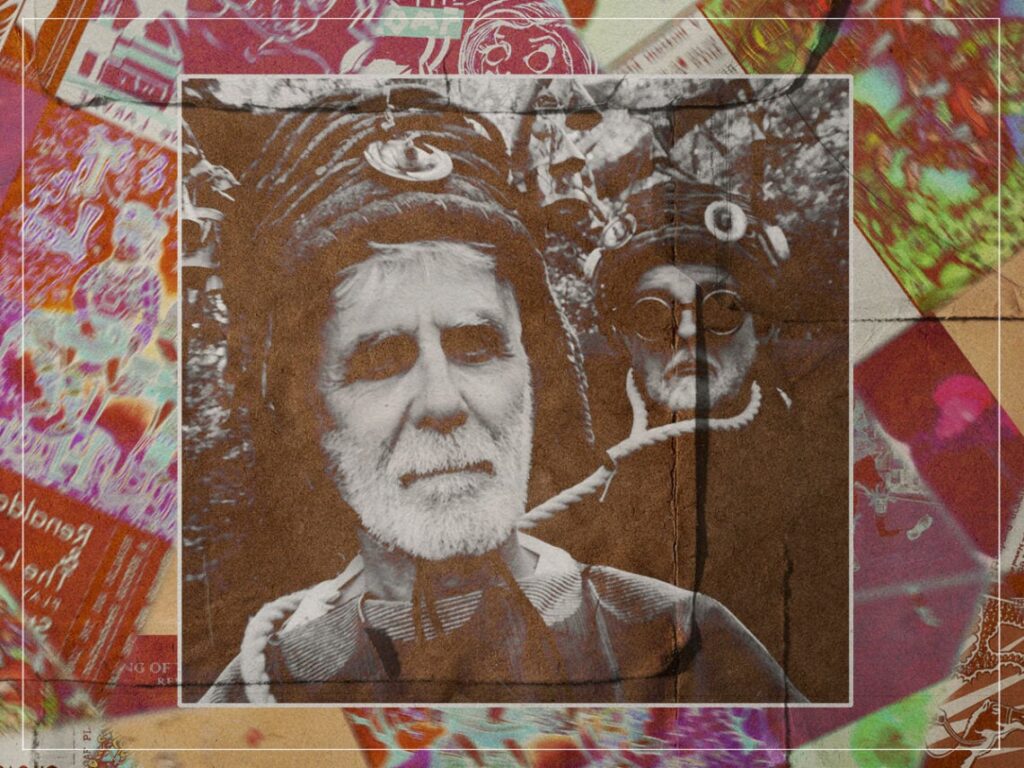Renaldo and The Loaf: when med-students made the weirdest music in Britain
 Posted On
Posted On
(Credits: Far Out / Renaldo and The Loaf)
Whenever you introduce a band to someone new, you’ll likely find yourself attempting to box them into certain categories. “They’re sort of rock, like Led Zeppelin, but also synth-infused like Depeche Mode,” you might say, as you attempt to make comparisons to persuade that they’re worth listening to. But then there are the bands that defy easy classification—those that are so unique that they don’t fit neatly into any familiar genre. It’s time we addressed Renaldo and The Loaf.
Bob Dylan once said, “Don’t criticise what you can’t understand”. In the case of Renaldo and The Loaf, he might be absolutely right. This enigmatic band that emerged in the 1970s is difficult to describe and analyse, not because they refuse to be placed in any category, but because the music is unlike anything you have ever heard. When you listen to experimental music or projects that have been created with the sole purpose of challenging or unsettling, the immediate response is often to turn away and decide it’s not for you.
In this case, however, the music is powerfully offputting in a way that beckons intrigue. Formed by Brian Poole and David Janssen, Renaldo and The Loaf connects everything you might associate with experimental music, like unconventional rhythms, sounds, and song structures, with a blend of various genres. However, at the crux of it lies a quirky, offbeat sensibility. In other words, Janssen and Poole managed to somehow create the weirdest-sounding music in the world while injecting it with charm and humour.
Their music has been described as anything you could possibly imagine—music that makes you feel like a child, sounds that reignite your musical intrigue, oddly inspiring ventures into that which others deem too daring to touch, you name it. All of these descriptions make complete sense, especially when you consider the fact that Poole and Janssen first met at school and bonded over their love of dinosaurs. A few years later, they began recording together, but what they created wasn’t what they considered “songs”. Instead, they viewed it as sound experiments, working alongside their friend Terry Nichols on an instrumental called ‘Segment’.
Interestingly, although many would likely regard this type of music as nothing more than two kindred souls putting together a series of strange sounds that seemed enticing only to them, labels saw a spark in their work, and one, Raw Records, signed them in 1978 after receiving demos in response to a newspaper ad. However, after working on a series of tapes at the label, they were given a backseat following the company’s dissolution, which pushed them to pursue other, more prominent labels. By this point, they had bought a more extensive tape recorder and began working on their debut album, Struve and Sneff.
During the 1970s and 1980s, a broader movement was emerging, one that more willingly embraced experimental and post-punk aesthetics, blending art with music in unconventional ways. However, while Renaldo and The Loaf flew relatively under the radar and still do to this day, their distinctive approach earned them something far more worthwhile than instant success—timeless intrigue. The following material, including their first LP, Songs For Swinging Larvae, blended the pair’s influence of classical literature, like the works of Arthur Conan Doyle and Samuel Beckett and their fascination with surrealism, creating a soundscape that was both intellectually challenging and sonically adventurous.
What made their material particularly inviting was the fact it wasn’t inviting at all—often, they would take the approach that would get them noticed, opting for haunting rhythms and controversial visuals that incited unease. However, beyond the usual experimentalist qualities, they also possessed a fundamental understanding of accessibility and often played it to their advantage to test and challenge the listener experience. Their approach was also defined mainly by the DIY ethos at the time, but they often took it a step further by incorporating non-musical objects as instruments, like toys, kitchen utensils, or anything else they could find in the nearby surroundings.
Those who are aware of Renaldo and The Loaf’s music often describe it with one word: eccentricity. However, this label overlooks the deeper layers of their unconventional artistry. Not only did Poole and Janssen push the boundaries of traditional music, they blended disparate influences while thoughtfully and intellectually exploring the boundaries of music as an art form. While The Police were enjoying the success of ‘Every Breath You Take’ in 1981, Renaldo and The Loaf were enjoying the puzzled hearts consuming the strange sounds of ‘Lime Jelly Grass’.
[embedded content]
Related Topics


